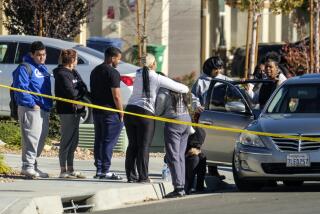Fullerton Man Guilty of Killing Parents, Brother
- Share via
SANTA ANA — A 23-year-old Fullerton mechanic was convicted Tuesday of murdering his parents and brother and then torching their bodies in a parked car.
Edward Charles III lowered his head but remained poised as he listened to the guilty verdicts that could land him on California’s death row.
“I’m glad that it’s over, so to speak,” said Charles’ grandfather, Bernard Severino, who testified that his grandson called from jail and asked him to take blame for the killings, saying, “You’ve lived your life.”
The same Orange County Superior Court jury returns to court Thursday for the trial’s penalty phase, where jurors will consider whether the Fullerton man should be sentenced to death or face life in prison without parole.
Relatives, many traveling from out of state to comfort the 73-year-old grandfather who still lives in the slain family’s home, expected the guilty verdicts but do not want Charles sentenced to death, an attorney for the defendant said.
“They will be supporting us in the quest for life without parole,” Deputy Public Defender Ronald Klar said.
Jurors found Charles guilty of first-degree murder for the death of his father, Edward Charles II, 55, a Hughes Aircraft engineer who had been stabbed and bludgeoned.
The jury also found Charles guilty of second-degree murder in the killings of his mother, Dolores, 47, a self-employed typist who had possibly been strangled, and his brother Danny, 19, an aspiring opera singer attending USC. The brother, who authorities believe was attacked first, was stabbed and fatally bludgeoned and stuffed in the trunk of the family Honda.
After more than three days of deliberation, jurors also found the mechanic guilty of a special circumstance allegation--that multiple murders occurred--that allows the prosecution to seek a death sentence.
Deputy Dist. Atty. David Brent contended during trial that hatred drove Charles to kill his family. He said Charles was jealous of his brother, faced disapproval from his parents over his girlfriend, and had argued with his parents over $50,000 he wanted from them to buy a gas station.
The defendant’s grandfather has said that Edward and Dolores Charles heaped praise on Danny, the award-winning performer, but that he could not recall any time they showed the same admiration for their elder son.
But defense attorneys said there were “no skeletons in the closet” and contended the prosecutor failed to prove why Charles would act totally “out of character” and kill his family.
Klar said the jury’s findings of the lesser murder charges for the mother’s and brother’s deaths should help him during the trial’s penalty phase.
Charles’ former girlfriend said the guilty verdict was expected by friends and family.
“I think they’ve known he was guilty from day one,” said Kim Speare, who dated Charles until about four months before the killings. “I think we all did.”
Although the prosecution did not offer a motive for the 1994 killings until the close of the three-week trial, Brent contended from the start that the evidence against Charles was overwhelming.
The prosecutor said the three victims were slain as Charles’ grandfather slept in another room, just a few hours after the family ate dinner together in their home in Fullerton’s affluent Sunny Hills community. The prosecutor told jurors that Charles sought to destroy the bodies in a car fire and concoct an alibi as part of a cover-up effort.
The bodies of all three victims were discovered in the family’s Honda, which was found torched in a La Mirada school parking lot on Nov. 7, 1994.
Charles, the family’s only other child, was arrested at the Fullerton home two days later.
Weeks after the arrest, Brent said, Charles telephoned from Orange County Jail asking his grandfather to take responsibility for the slayings, and later wrote an incriminating letter that was to be used to make the killings look like a robbery. As part of the robbery scheme, Charles had plotted from jail to have his grandfather robbed or killed and them blame the intruder for the other murders, the prosecutor and police alleged.
Defense attorneys contended that Charles did not write the incriminating letter, that it came from a jail inmate seeking special treatment from authorities. They acknowledged it was “cold” for Charles to ask his grandfather to take the blame, but told jurors he was confused and desperate at being jailed on a capital charge.
The penalty phase begins Thursday before Superior Court Judge Everett W. Dickey and is expected to include testimony from more than a dozen defense character witnesses, including friends and relatives, Klar said.
The prosecutor said he plans to call just one witness, Charles’ grandfather.
More to Read
Sign up for Essential California
The most important California stories and recommendations in your inbox every morning.
You may occasionally receive promotional content from the Los Angeles Times.













